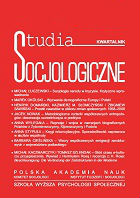Handel ludźmi - aspekty społeczne i prawne
Human Trafficking – Social and Legal Aspects
Author(s): Zbigniew LasocikSubject(s): Social Sciences
Published by: Instytut Filozofii i Socjologii Polskiej Akademii Nauk
Keywords: human trafficking; victim of human trafficking; human smuggling; slavery; servitude; modern-day slavery
Summary/Abstract: Human trafficking has been a growing concern for the international public opinion in recent years. While slavery and similar practices seem to be a thing of the past, the problem persists in a variety of forms, including forced prostitution, forced labour, child pornography or trafficking of human organs and may even take on less explicit forms, such as forced marriages. Whatever the form, human trafficking means total servitude and leads to denial of humanity. Human trafficking is a form of slavery, a serious crime and a major violation of human rights. Because of this, governments must provide an effective means to combat the problem and first and foremost protect and support the victims. Civil society also carries an important responsibility and has its role to play. There must be public awareness of the problem of human trafficking to exert pressure on governments to meet their responsibilities and develop social infrastructure designed to support and protect the victims. Human trafficking has been and continues to be on the agenda of a variety of international fora and is the subject of international and national legal regulations.
Journal: Studia Socjologiczne
- Issue Year: 187/2007
- Issue No: 4
- Page Range: 31-57
- Page Count: 27
- Language: Polish

